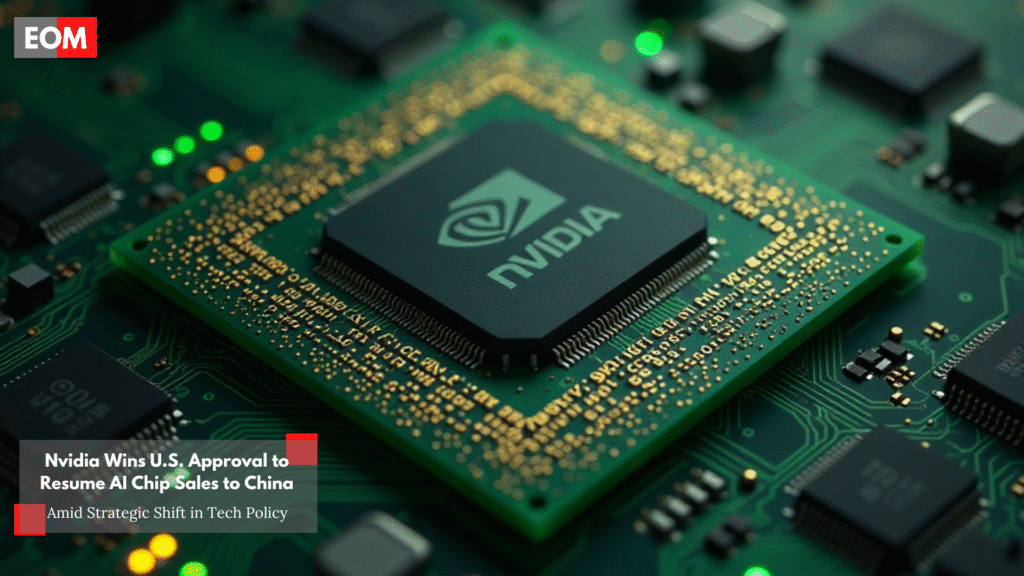Nvidia Wins U.S. Approval to Resume AI Chip Sales to China Amid Strategic Shift in Tech Policy

Washington, D.C. – July 2025
In a move signaling a more flexible approach to tech exports, U.S. regulators have granted Nvidia clearance to resume sales of its Nvidia H20 chips to China. The decision marks a strategic reversal from months of stringent export restrictions that cost the company billions and strained tech relations between Washington and Beijing.
The H20 chips—engineered specifically to comply with U.S. export controls—can now be shipped to Chinese customers under approved licensing terms. Nvidia CEO Jensen Huang confirmed that the company has initiated license applications and is preparing for renewed shipments to one of its most critical global markets.
China’s AI Market Remains Vital to U.S. Tech Leaders
The approval comes after private discussions between Huang and top U.S. officials, including a meeting with former President Donald Trump, now re-engaged on key tech issues. Huang stressed that China represents 13% of Nvidia’s annual revenue and is home to nearly half of the world’s AI researchers—underscoring the necessity of continued engagement with the Chinese market.
Export restrictions previously halted H20 shipments for over a quarter, costing Nvidia an estimated $8 billion in lost revenue opportunities. The renewed access could help the chipmaker reclaim ground in the region, while also reinforcing its leadership in the global AI race.
Balancing National Security and Market Access
Despite concerns from U.S. lawmakers, Huang dismissed fears that Nvidia’s technology would support Chinese military or intelligence operations. In a recent interview with Bloomberg, he argued that military misuse of Nvidia chips is unlikely, given operational limitations and tight regulatory oversight.
“We should want our technology to be everywhere,” Huang noted, likening U.S. AI dominance to the global role of the U.S. dollar. “Restricting it could push countries toward developing rival platforms.”
Nonetheless, a bipartisan coalition in Congress has urged Nvidia to remain cautious, especially when engaging with firms tied to China’s defense and surveillance infrastructure. The tension reflects a larger debate about how to balance economic innovation with national security interests in an era of strategic tech competition.
Market Response and Industry Implications
Industry analysts see the U.S. government’s approval as a calculated, pragmatic shift. While more advanced AI chips—such as the Nvidia H100 and A100—remain restricted, the H20’s reinstatement suggests a nuanced tech trade policy that allows economic engagement without fully compromising security.
The announcement has boosted investor confidence, with Nvidia shares trending upward on anticipation of renewed Chinese demand. The company is also expected to host a media event in Beijing on July 16, signaling its continued commitment to the Chinese market.
Meanwhile, China is doubling down on domestic chip innovation through companies like Huawei and Cambricon, aiming to reduce reliance on U.S. technology. Analysts warn that over-restriction from Washington could inadvertently accelerate the rise of non-U.S. AI ecosystems.
Conclusion: U.S. Tech Leadership Through Strategic Engagement
Nvidia’s restored ability to sell its H20 chips to China marks a pivotal moment in the U.S.–China tech dynamic. It reflects a broader recognition that global leadership in AI innovation requires engagement, not isolation.
For Nvidia, the approval is not just a financial win—it’s a powerful endorsement of its vision to position U.S. technology as the global AI standard. For Washington, the move could signal a new phase of calibrated competition, where economic diplomacy complements national security strategy.

